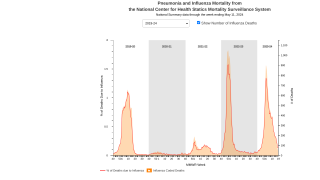Benefits Confirmed of Adjuvanted Seasonal Influenza Vaccines

A systematic review and meta-analysis presented at the European Scientific Working Group on Influenza virtual conference on December 7, 2020, confirmed the benefit of an MF59®-adjuvanted trivalent seasonal influenza vaccine (aTIV) for adults 65 years and older.
As announced by Seqirus, the results indicate that relative vaccine effectiveness (rVE) favored aTIV over non-adjuvanted standard dose quadrivalent and trivalent influenza vaccines in averting influenza-related medical encounters.
Additionally, Seqirus stated ‘aTIV was comparable to a high-dose TIV for the same outcome.’
The data presented at ESWI 2020 comes from a systematic review and meta-analysis of 16 real-world studies over a period of 20 years that evaluated the effectiveness of vaccination with aTIV relative to non-adjuvanted egg-based influenza vaccines or no vaccine in adults 65 years or older.
“To have results from a systematic review and meta-analysis provides an additional level of evidence for the benefit of adjuvanted influenza vaccines in older adults who face age-related immune decline,” said Brenda L. Coleman, RN, Ph.D., Infectious Disease Epidemiologist, Sinai Health System, Toronto; Assistant Professor, Dalla Lana School of Public Health, University of Toronto, in a related press statement.
The MF59 adjuvant was designed to enhance the immune response by increasing the magnitude and persistence of antibody response and creating more diverse cross-reactive antibodies.
This adjuvant benefit may be important when there is a mismatch between the virus strains included in the vaccine and the strains circulating in the community.
Seasonal influenza vaccine effectiveness may be impacted by the age-related immune decline in this population, which can result in a reduced immune response to standard influenza vaccines.
The quadrivalent formulation of the MF59-adjuvanted influenza vaccine, which adds an additional B strain to the trivalent formulation, was approved by the U.S. Food and Drug Administration in February 2020, and in Europe in March 2020, and is available for the 2020/21 influenza season.
Gregg Sylvester, M.D., Chief Medical Officer at Seqirus, added, “With both COVID-19 and influenza circulating in the Northern Hemisphere this season, it’s critical that as many people as possible receive an influenza vaccine to protect against the flu, and therefore help to keep pressure off health systems during the continuing pandemic.”
This abstract is a systematic review and meta-analysis on real-world studies that evaluated the effectiveness of vaccination with MF59®-adjuvanted trivalent seasonal influenza vaccine (aTIV) relative to vaccination with non-adjuvanted egg-based influenza vaccines or no vaccine in adults 65 years of age and above.
The meta-analysis of studies found that aTIV was effective in reducing general practice visits and hospital admissions. And pooled estimates of rVE favored aTIV over non-adjuvanted standard dose quadrivalent and trivalent influenza vaccines in averting influenza-related medical encounters.
Although substantial heterogeneity was observed, estimates for rVE were consistently in favor of aTIV over the standard-dose non-adjuvanted vaccines, with the exception of one study.
Influenza is a common, contagious seasonal respiratory disease that may cause severe illness and life-threatening complications in some people, says the US Centers for Disease Control and Prevention (CDC).
The CDC recommends the annual flu shot for individuals aged 6 months and older, who do not have any contraindications. Since it takes about 2-weeks after vaccination for antibodies to develop in the body that helps protect against influenza virus infection, it is recommended that people get vaccinated before influenza begins spreading in their community.
Because transmission of influenza viruses to others may occur one day before symptoms develop and up to 5 to 7 days after becoming sick, the disease can be easily transmitted to others.
Preliminary estimates from the CDC report that from October 1, 2019, through April 4, 2020, there were an estimated 410,000 to 740,000 influenza-related hospitalizations in the USA.
As of early December 2020, the CDC confirmed there have not been any pediatric fatalities related to influenza during the 2020-2021 flu season. This good news contrasts with the 2019-2020 flu season when 195 pediatric fatalities were confirmed by the CDC.
Seqirus is part of CSL Limited and is one of the largest influenza vaccine providers in the world.
PrecisionVaccinations publishes research-based influenza vaccine news.
Our Trust Standards: Medical Advisory Committee
























